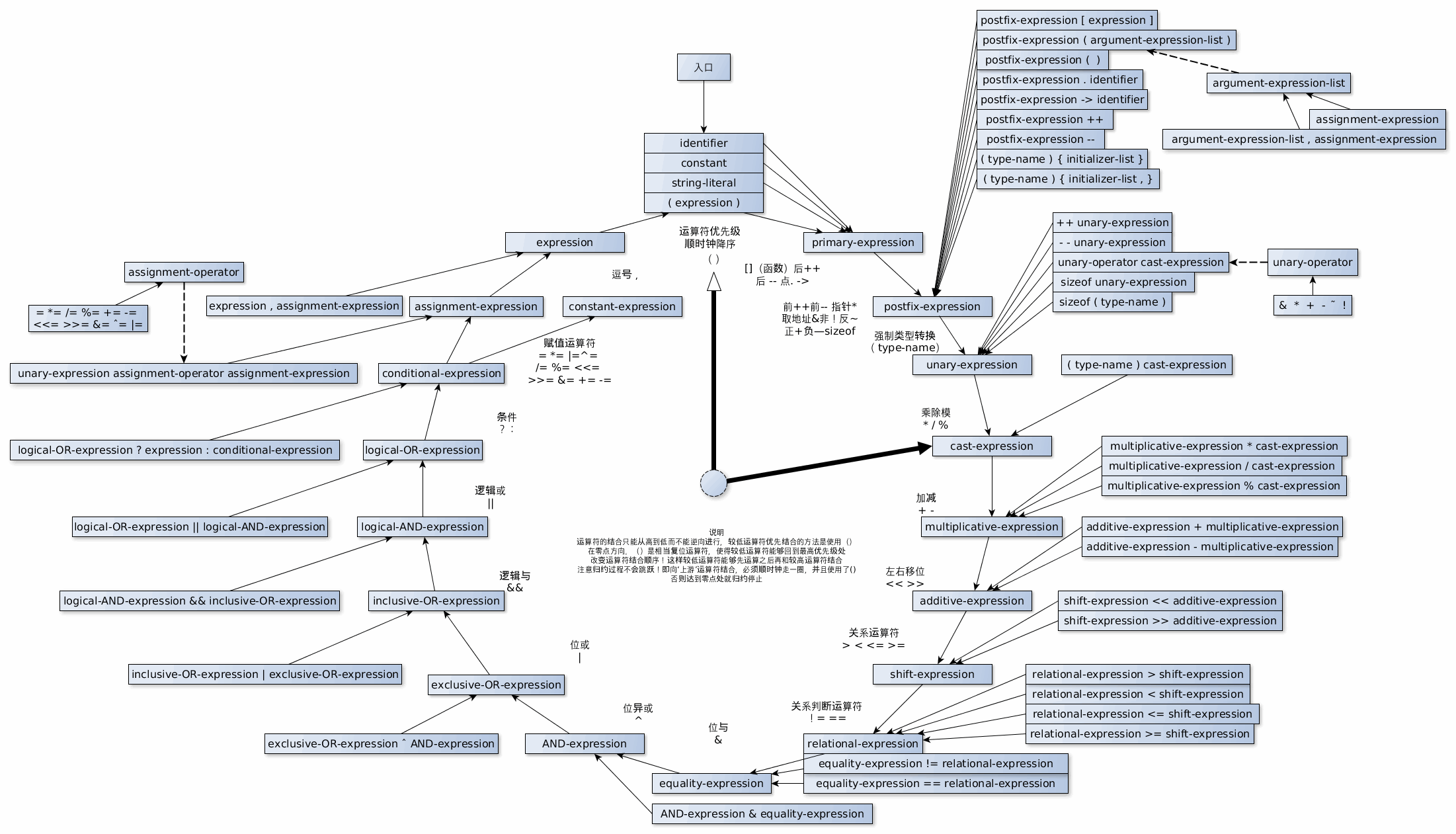70,039
社区成员
 发帖
发帖 与我相关
与我相关 我的任务
我的任务 分享
分享#include <stdio.h>
#define SIZE 10
int sump(int *start,int *end);
int main()
{
int marbles[SIZE]={20,10,5,39,4,16,19,26,31,20};
long answer;
answer=sump(marbles,marbles+SIZE);
printf("%ld.\n",answer);
return 0;
}
int sump(int *start,int *end)
{
int total=0;
while(start<end)
total+=*(start++);
return total;
}

{
int temp;
temp = i;
i = i+1;
return temp;
}

//只要了解后缀 ++ 就很清楚了
// 后缀 ++ 其实就是豆号表达式组
// 如: 把 start++ 展开就是
int *tmp; //编译器创建的临时变量
(tmp = start, start = start + 1, tmp);
//那么: total+=*(start++); 就是
int *tmp;
total += *( (tmp = start, start = start + 1, tmp) ); // 所以外面这对 () 添加以否都是一样的
// 一目了然了.....
//
//C++ Operators
// Operators specify an evaluation to be performed on one of the following:
// One operand (unary operator)
// Two operands (binary operator)
// Three operands (ternary operator)
// The C++ language includes all C operators and adds several new operators.
// Table 1.1 lists the operators available in Microsoft C++.
// Operators follow a strict precedence which defines the evaluation order of
//expressions containing these operators. Operators associate with either the
//expression on their left or the expression on their right; this is called
//“associativity.” Operators in the same group have equal precedence and are
//evaluated left to right in an expression unless explicitly forced by a pair of
//parentheses, ( ).
// Table 1.1 shows the precedence and associativity of C++ operators
// (from highest to lowest precedence).
//
//Table 1.1 C++ Operator Precedence and Associativity
// The highest precedence level is at the top of the table.
//+------------------+-----------------------------------------+---------------+
//| Operator | Name or Meaning | Associativity |
//+------------------+-----------------------------------------+---------------+
//| :: | Scope resolution | None |
//| :: | Global | None |
//| [ ] | Array subscript | Left to right |
//| ( ) | Function call | Left to right |
//| ( ) | Conversion | None |
//| . | Member selection (object) | Left to right |
//| -> | Member selection (pointer) | Left to right |
//| ++ | Postfix increment | None |
//| -- | Postfix decrement | None |
//| new | Allocate object | None |
//| delete | Deallocate object | None |
//| delete[ ] | Deallocate object | None |
//| ++ | Prefix increment | None |
//| -- | Prefix decrement | None |
//| * | Dereference | None |
//| & | Address-of | None |
//| + | Unary plus | None |
//| - | Arithmetic negation (unary) | None |
//| ! | Logical NOT | None |
//| ~ | Bitwise complement | None |
//| sizeof | Size of object | None |
//| sizeof ( ) | Size of type | None |
//| typeid( ) | type name | None |
//| (type) | Type cast (conversion) | Right to left |
//| const_cast | Type cast (conversion) | None |
//| dynamic_cast | Type cast (conversion) | None |
//| reinterpret_cast | Type cast (conversion) | None |
//| static_cast | Type cast (conversion) | None |
//| .* | Apply pointer to class member (objects) | Left to right |
//| ->* | Dereference pointer to class member | Left to right |
//| * | Multiplication | Left to right |
//| / | Division | Left to right |
//| % | Remainder (modulus) | Left to right |
//| + | Addition | Left to right |
//| - | Subtraction | Left to right |
//| << | Left shift | Left to right |
//| >> | Right shift | Left to right |
//| < | Less than | Left to right |
//| > | Greater than | Left to right |
//| <= | Less than or equal to | Left to right |
//| >= | Greater than or equal to | Left to right |
//| == | Equality | Left to right |
//| != | Inequality | Left to right |
//| & | Bitwise AND | Left to right |
//| ^ | Bitwise exclusive OR | Left to right |
//| | | Bitwise OR | Left to right |
//| && | Logical AND | Left to right |
//| || | Logical OR | Left to right |
//| e1?e2:e3 | Conditional | Right to left |
//| = | Assignment | Right to left |
//| *= | Multiplication assignment | Right to left |
//| /= | Division assignment | Right to left |
//| %= | Modulus assignment | Right to left |
//| += | Addition assignment | Right to left |
//| -= | Subtraction assignment | Right to left |
//| <<= | Left-shift assignment | Right to left |
//| >>= | Right-shift assignment | Right to left |
//| &= | Bitwise AND assignment | Right to left |
//| |= | Bitwise inclusive OR assignment | Right to left |
//| ^= | Bitwise exclusive OR assignment | Right to left |
//| , | Comma | Left to right |
//+------------------+-----------------------------------------+---------------+